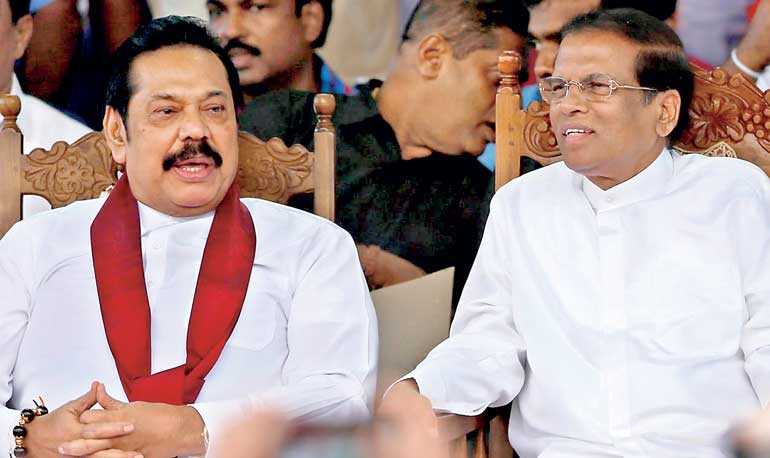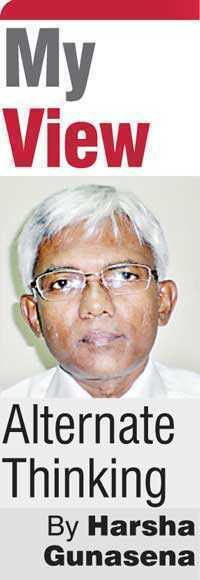Saturday Feb 07, 2026
Saturday Feb 07, 2026
Monday, 12 November 2018 00:00 - - {{hitsCtrl.values.hits}}

FILE PHOTO: President Maithripala Sirisena with newly elected Prime Minister Mahinda Rajapaksa – REUTERS
Maithripala Sirisena is trying to settle his personal political rivalry with Ranil Wickremesinghe in an unconstitutional way and has plunged the whole country into chaos in the process. He has virtually taken over the Government by force. This is nothing but a coup d’état.
His removal of the incumbent Prime Minister and appointment of the new Prime Minister was against the provisions of the Constitution. It is evident that at the time of the appointment, the new Prime Minister did not command the confidence of the Parliament. The President himself was in the process of getting the support of the Members of Parliament for the new Prime Minister. In order to make time for this process, he prorogued the Parliament. Then it was reported that he will advance the date of commencement of the Parliament to 7 November. It was advanced by two days to 14 November. It was revealed that there was a plan to postpone the Parliament sessions after his speech without allowing the Parliament to show its confidence or otherwise to the new Prime Minister. By dissolving the Parliament, it is evident that the new Prime Minister did not command the confidence of the Parliament. This means Wickremesinghe, the de jure Prime Minister, has the confidence of the Parliament. Therefore, the process is unconstitutional altogether. Moreover, we know the malpractices and the practices under which the last Presidential election and the last General election were respectively held.
There are arguments against as well as in favour of the dissolution. Under Article 33(2) (c), the President has the power to dissolve the Parliament. “In addition to the powers, duties and functions expressly conferred or imposed on, or assigned to the President by the Constitution or other written law, the President shall have the power to summon, prorogue and dissolve Parliament”. In elaborating this power, in Article 70 (1) it was stated that he can do so only after four-and-a-half years of commencement of the Parliament or that the Parliament itself should approve the dissolution by a two-thirds majority.
“The President may by proclamation summon, prorogue and dissolve Parliament, provided that the President shall not dissolve Parliament until the expiration of a period of not less than four years and six months from the date appointed for its first meeting, unless Parliament requests the President to do so by a resolution passed by not less than two-thirds of the whole number of Members (including those not present), voting in its favour.”
The question is whether the country should allow this unconstitutional process to proceed. It should be stopped, and the process should be reversed. Otherwise, in the future, any President, if he has a dislike towards the appointed Prime Minister, can remove him at any time. If the new Prime Minister cannot get the confidence of the Parliament, the President will dissolve the Parliament even within a period of one year of its commencement. This may even repeat at the very next Parliament. There are rules, regulations and the Constitution for us to follow and not to break based on one’s whims and fancies.
The unfortunate situation we are facing today is that so-called learned persons such as former Chief Justice Sarath Silva, former President of Bar Association Wijedasa Rajapaksa and former Professor of Law at Colombo University G. L. Peiris are justifying the dissolution of Parliament. Their arguments are all subjective and not objective. If those arguments are correct, by introducing the 19th Amendment to the Constitution, the country has gone back beyond the original Constitution of 1978 since now the President can dissolve the Parliament even before the expiration of the period of one year.
People tend to think that since we are going to get the mandate from the people who have sovereignty, dissolution is fine and that is the only way out. It is not. We have a representative democracy. We have a Constitution where it was demarcated when to have the elections. In the US, the Presidential election has certain dates. Elections cannot be called based on one’s personal views. We cannot have elections violating the provisions of the Constitution.
It was reported in the print media that there was an attempted coup in order to retain power illegally soon after it was evident that the incumbent President was losing. It was further reported that the attempt was abandoned after the expressed reluctance of the senior Government officers. The truth was not revealed since an investigation was not carried out. The present situation was also created by the arbitrary and illegal acts of the President, who rushes in where angels fear to tread. Others who are responsible should act. Therefore, it is the duty of the Chairman of the Elections Commission to seek the opinion of the Supreme Court whether the dissolution of the Parliament was legal. The Supreme Court, as the third pillar of the State, should intervene in this act against the legislature by the Executive.
In order to resolve the existing impasse, there should be a political consensus since legally, it may be a deadlock.
This is an appropriate time to investigate the value system of our society. Since we are dealing with the Constitution, we should see the preamble of our Constitution, as follows.
“...whilst ratifying the immutable republican principles of representative democracy and assuring to all peoples freedom, equality, justice, fundamental human rights and the independence of the judiciary as the intangible heritage that guarantees the dignity and well-being of succeeding generations of the People of Sri Lanka and of all the people of the world, who come to share with those generations the effort of working for the creation and preservation of a just and free society…”
In the preamble of the US Constitution, it is stated as follows.
“We the people of the United States, in order to form a more perfect union, establish justice, insure domestic tranquillity, provide for the common defence, promote the general welfare, and secure the blessings of liberty to ourselves and our posterity, do ordain and establish this Constitution for the United States of America.”
Quote of the French Constitution’s preamble is as follows.
“By virtue of these principles and that of the self-determination of peoples, the Republic offers to the overseas territories which have expressed the will to adhere to them new institutions founded on the common ideal of liberty, equality and fraternity and conceived for the purpose of their democratic development.”
The preamble of the Indian Constitution is as follows.
“We, the people of India, having solemnly resolved to constitute India into a sovereign socialist secular democratic republic and to secure to all its citizens: justice, social, economic and political; liberty of thought, expression, belief, faith and worship; equality of status and of opportunity; and to promote among them all fraternity assuring the dignity of the individual and the unity and integrity of the nation.”
The main value lacking in our Constitution compared to other Constitutions is liberty. What is liberty? “Liberty entails the responsible use of freedom under the rule of law without depriving anyone else of their freedom. Freedom is broader in that it represents a total lack of restraint or the unrestrained ability to fulfil one’s desires. For example, a person can have the freedom to murder, but not have the liberty to murder, as the latter example deprives others of their right not to be harmed.”
We do not have a Sinhala word for liberty; the concept is alien to us. That is why we tend to ignore the rule of law. We tend to take the rule of law into our hands even in day-to-day activities. When the President of the country takes the rule of law of the whole country into his hands and violates the supreme law of the country, we tend to say that it is fine. We think that even if one of us were there, that person would also do the same thing. We decide on our political affiliations and not on the principles.
During the time of the Buddha in 6th century BC, Ajasath, the king of Magadha and a devotee of Buddha, wanted to invade the Vajji territory. Buddha advised Vassakara, the Chief Minister of Ajasath, not to go ahead. The Buddha further said that the Lichchavis, rulers of Vajji, could not be suppressed and defeated until they had adhered to the seven Dhammas, which were not conducive to defeat (Sapta Aparihaniya Dhamma). The first three points of those seven points were as follows.
They held regular meetings to discuss matters pertaining to the day-to-day administration.
They met, worked and dispersed as a team.
They strictly followed the law of the country.
We have to learn democracy and the related values either from the west or from the east. Hence, we have a long way to go in the path of the democracy which was bestowed upon us.